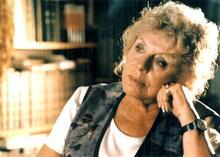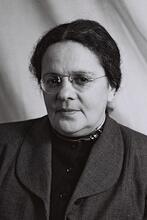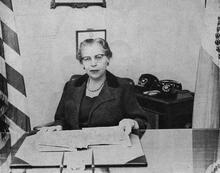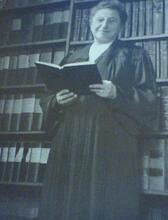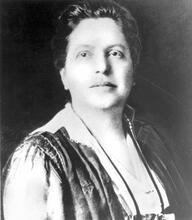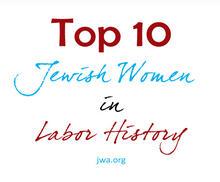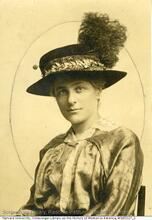Dorothy Straus
Dorothy Straus was a lawyer and an organizer for the protection and advancement of women. Straus was chair of the New York League of Women Voters’ municipal affairs committee, leading her to be chosen to represent the United States on the Committee on Nationality of Married Women of the International Alliance of Women for Suffrage and Equal Citizenship. On a local level, Straus was appointed by Mayor Fiorello LaGuardia to the mayor’s committee investigating unemployment relief, in addition to the New York State Planning Council. She was named a special lecturer of law at Bryn Mawr’s Graduate Department of Social Economy and Social Research, and was one of the first twelve women to be admitted to the Bar Association of New York City.
Over the course of her life, Dorothy Straus was active as a lawyer, college lecturer, Democrat, member of the League of Women Voters, and member of several municipal and state government committees. In her writings, public statements, and activities, she demonstrated a commitment to efficient, socially active government policies, especially regarding the protection and advancement of women.
Education and legal work
The daughter of Philip and Sarah (Strauss) Straus, Dorothy was born on April 12, 1888, in New York City, where she lived for most of her life. She began her education at Normal College (later known as Hunter College), which she attended from 1897 to 1901. From 1901 to 1904, she was enrolled at Dr. Julius Sachs’ School for Girls, and subsequently obtained an A.B. from Bryn Mawr College in 1908 and an LL.B. from New York University Law School in 1911. She practiced law with Hays, Kaufman, and Lindheim (1911–1917); with Coleman, Stern, and Ellenwood (1917–1923); in private practice (1923–1930); and, finally, as a partner in the firm of Straus and (Dorothy) Kenyon.
Government and advocacy work
In addition to her legal work, Dorothy Straus served as an organizer and, from 1914 to 1917, as treasurer of the League for Business Opportunities for Women. She was chair of the New York League of Women Voters’ municipal affairs committee from 1922 to 1926 and, in 1928, became the sole woman appointee to the subcommittee on budget, finance, and revenues of Mayor James J. Walker’s Committee on Plan and Survey. Straus’s involvement with the League of Women Voters led to her being chosen to represent the United States on the Committee on Nationality of Married Women of the International Alliance of Women for Suffrage and Equal Citizenship. As a delegate at the alliance’s 1929 summer congress in Berlin, Straus endorsed the principle of gender equality in laws regarding nationality rights and the retention of citizenship. At that time, many nations, including the United States, revoked a woman’s citizenship if she married a foreign national and resided in her spouse’s country for a specified period of time. Such restrictions did not apply to married men. Straus believed that a woman’s nationality should not be subject to change on the basis of marital status and that citizenship laws should apply to men and women equally.
On a local level, Straus was appointed by Mayor Fiorello LaGuardia to the mayor’s committee investigating unemployment relief for the years 1934 and 1935. She was appointed to the New York State Planning Council in 1935 and reappointed in 1936, was named a special lecturer of law at Bryn Mawr’s Graduate Department of Social Economy and Social Research in 1936, and was one of the first twelve women to be admitted in 1937 to the Bar Association of New York City. As the only female member of the newly created State Planning Council, Straus viewed her position as an opportunity to improve the efficiency of both government building projects and the use of natural resources. In addition, she hoped to educate women’s organizations about the work of the council, and of government in general, in order to increase their participation in civic and political activities.
Straus’ philosophy and legacy
While Straus advocated an expanded public role for women, she opposed the Equal Rights Amendment, which would have placed men and women legally on an equal footing. Her writings and congressional testimony of the late 1930s and early 1940s indicate that she feared, as did labor unions and the League of Women Voters, that minimum wage and maximum hour protections for working women would be repealed by the passage of the ERA. More specifically, she criticized the lack of a clear definition of “equal,” believing that the legal system would become chaotic as numerous laws were reexamined and modified without clear constitutional or legislative guidelines.
Straus was part of the first generation of urban professional women in America. She helped break down gender barriers in professional organizations and government and, despite her opposition to the ERA, advocated the improvement of women’s status. As an assistant secretary for the 1938 New York State Democratic convention, she was guided by her party affiliation and a progressive belief that government should actively protect the disadvantaged. One of her last public acts was her resignation in 1944 from the state’s Committee on Discrimination, citing delays in the passage of key legislation and the group’s lack of power. Dorothy Straus died on July 22, 1960, in Bar Harbor, Maine.
Selected works by Dorothy Straus
“I Swear Allegiance to ...” The Woman’s Journal 15, no. 1 (January 1930): 28–29.
“Independent Nationality Through National Laws.” The Congressional Digest 9, no. 11 (November 1930): 281–282.
“Librarians Underpaid.” Letter. NYTimes, August 28, 1925, 12.
“The President’s Work.” Letter. NYTimes, November 6, 1916, 10.
AJYB 63 (1962): 562.
“Bar Group Turns to Noted Women.” NYTimes, October 24, 1937, sec. 6, p. 7.
“‘Equal Rights’ Held a Peril to Women.” NYTimes, August 8, 1937, 1–2.
Eustis, Grace Hendrick. “Meeting for Discussion and Explanation of Revised City Document Will Be Held Tomorrow—Many Groups Aid.” NYTimes, October 18, 1936, sec. 6, p. 7.
“Foe Tells Views On Women’s Pact.” NYTimes, December 21, 1933, 18.
“The Legislative Journey of the Equal-Rights Amendment 1923–1943.” The Congressional Digest 22, no. 4 (April 1943): 105–128.
McLaughlin, Kathleen. “New Opportunity for Women Seen.” NYTimes, December 15, 1935, sec. 2, p. 6, and “Quiet Mrs. Lehman Avoids Spotlight.” NYTimes, September 30, 1938, 17, and “Roosevelt ‘Purge’ Upheld by Hopkins.” NYTimes, August 31, 1938: 6, and “Women Argue ‘Equal Rights.’” NYTimes, February 13, 1938, sec. 4, p. 7, and “Women Condemn Equal Rights Plan.” NYTimes, February 8, 1938, 7, and “Women Democrats Praise Court Bill.” NYTimes, June 15, 1937, 15, and “New Body Takes Up Fight on Bond Issue.” NYTimes, October 22, 1925, 5.
Petersen, Anne. “Campaign is Begun by 10 Women Here.” NYTimes, February 27, 1938, sec. 6, p. 5, and “Converts Sought by the Opposition.” NYTimes, March 27, 1938, sec. 6, p. 5, and “Delay in Naming Frieda Miller Stirs Protests.” April 2, 1939, sec. 2, p. 5.
“Quitting Bias Unit, 8 Criticize Dewey.” NYTimes, March 27, 1944, 19.
“Renamed to State Boards.” NYTimes, February 10, 1937, 10.
“Topics of the Times: Bar is Lifted.” NYTimes, October 22, 1937, 22.
“Woman Legislator Spurns Smartness.” NYTimes, May 21, 1942, 22.
“Woman Wins Suit for Commission.” NYTimes, March 11, 1925, 4.
WWIAJ (1938).


